Wooden Utensil 101
Caring for your wooden spoons is simple! Learn how to care for wooden kitchen utensils and keep them looking nice and lasting a lifetime! These easy steps can show you how to care for and maintain your wooden utensils and turn them into quality heirloom pieces that you can pass down for generations.
Do your wooden spoons look fuzzy?
Are splits plaguing your wooden cutting boards?
Do you struggle with purchasing quality utensils because you aren’t sure how to take care of them?
I so feel you! Sometimes it feels like life is hard enough as it is without having to do special things to certain tools, right? Like I KNOW I shouldn’t throw my steak knives and wooden spoons in the dishwasher… and yet….
Gorgeous hand crafted wooden spoons, rolling pins and cutting boards, etc. are all the rage right now, but the price tag can totally scare you away. Not that these beautiful kitchen utensils aren’t worth every single penny, but it can be a mental struggle to spend money on something you are afraid you might ruin with the first curry or blackberry jam you make.
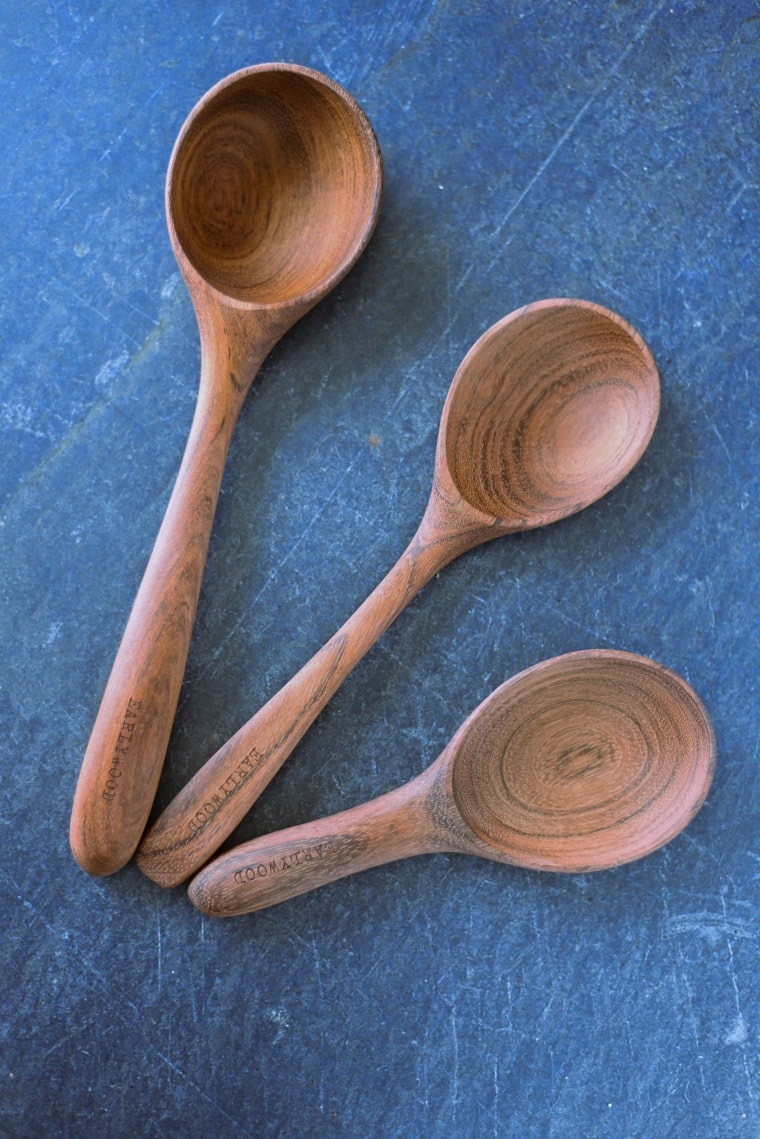
Thank you to Earlywood Designs for sponsoring this post. And Thank YOU for supporting the brands that support me and allow me to continue to grow my blog. All opinions and photographs are my own.
How to Care for Your Wooden Utensils
Wooden kitchen utensils are hard working, all-purpose tools that can do everything from mix muffin batter to stir homemade jam to help you prepare your awesome weeknight dinner. With a little working knowledge and TLC, your wooden kitchen utensils can turn into heirloom pieces you pass down to your children. No, really!
How to Clean Wooden Kitchen Utensils
Cleaning wooden kitchen utensils is actually really simple – just three quick steps!
Step 1: Always wash your wooden utensils by hand. Never, ever, ever put them in the dishwasher. The high temperatures and super long cycles of the dishwasher actually cause disaster to your wooden utensils. Think of them like little sponges – they will soak up way too much water, and all the flavors and all the smells of everything else in your dishwasher. Blech! Throwing your wooden kitchen utensils in the dishwasher results in gray and fuzzy utensils with a short life span. Not really what you want for that gorgeous hand crafted piece, right?
Step 2: Use hot water and a mild dish soap. You can use either a washcloth or a bristled brush to scrub your utensils.
Step 3: Prop them up to dry. This will allow as much airflow around them as possible to help even out drying and minimize the effects of expanding and contracting that happens when wood gets wet.
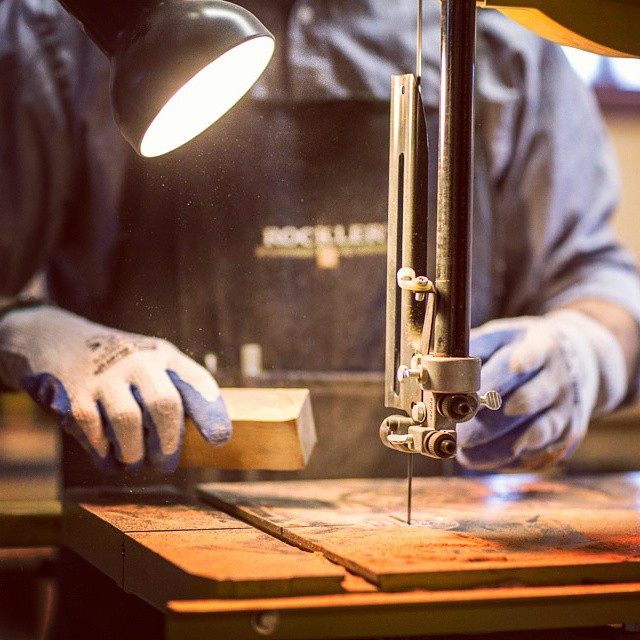
How to Keep Wooden Kitchen Utensils Looking Nice
Every now and then you should give your wooden kitchen utensils a coat of oil. This will form a protective yet flexible barrier that will help to control the wood’s natural desire to fluctuate its moisture content. By deterring this, you help prevent fading, cracks and splitting, and also help the wood to become more resistant to absorbing stains and odors.
A Breakdown of Oils to Use on Wood
Don’t just use any old oil you have laying around. It is important to use the right oil that will protect your wood but also not impart flavors or weird additives to your wood. It needs to be protective, reduce moisture intake, yet also be breathable.
- Polyurethanes and varnishes and things you use to seal furniture are NOT food safe. Not only are they not safe to eat, but they smell terrible, and that coating will eventually crack and chip off into your food. Yuck! Skip these!
- Food based oils (like olive oil or vegetable oil) never really dry, and they can discolor your utensils, turn sticky, and go rancid, which makes your utensils smell down right terrible. So skip those, too!
- An exception to this is Walnut Oil and Linseed Oil. They won’t go rancid, and they will dry, so they are often recommended. However it can develop a sticky feeling, so only apply it in thin layers to tools you are using and washing a lot. They will impart a yellow or amber cast to the utensils you use it on, and also oxidize and darken with age and explore to the sunlight. You will need to apply several coats! Use with discretion if you have a nut allergy.
- Beeswax is often recommended, as it is safe to eat and gives you a beautiful shiny, smooth surface that is pretty waterproof. But it tends to harden at room temperature and then melt at hot temperatures. So the second you start stirring a hot soup, guess where all that wax is going? Yup. Right into your soup. Not only are you now eating trace amounts of wax, but your spoon just lost all the protection it once had. There are lots of “wood butters” out there that have a combination of oils and wax, which some people think meets the best of both worlds. Either way, it needs a lot of maintenance.
- Petroleum based oils like Mineral Oil are also recommended. Sometimes they get a bad wrap for being petroleum based, but its totally food safe, it penetrates the wood grain really well, it won’t go rancid, and won’t leave a sticky residue, and it is odorless. These have an awesomely long shelf life.
So which one should you use? Honestly, the choice is up to you, depending on your lifestyle and how often you plan on using your tools and conditioning your wood. Personally I use and recommend the Wood Oil from Earlywood Designs – it is petroleum based with mineral oil, but I like how easily it goes on and how well it protects the wood. It is 100% food safe, and I like that they add lemon peel oil to it, too, which has antimicrobial properties (and smells nice!).
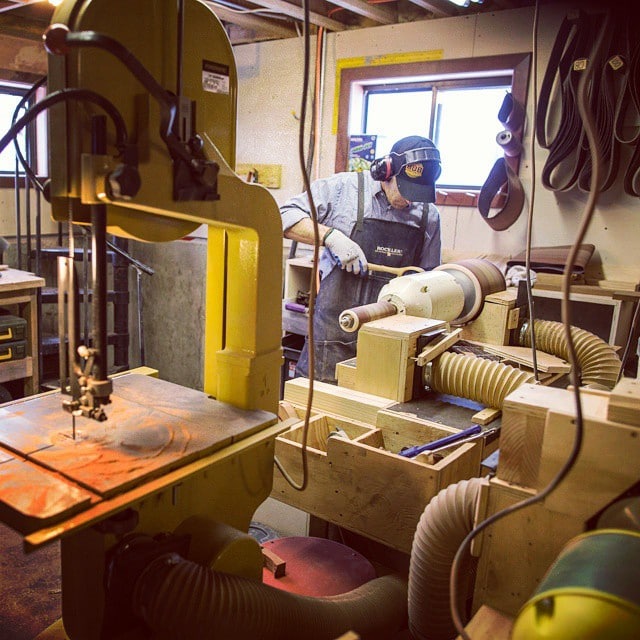
How to Oil Wooden Utensils – The Easy Way
- Pour a small amount of oil directly onto the surface.
- Use a clean, lint-free rag to wipe the oil over the entire surface. Allow the oil to soak into the wood for 15-20 minutes (or overnight is even better!).
- Use a second clean rag to buff the surface of the wood and remove any excess oil.
- Ta-Da! You are done!
If you are more of a visual person and you want to actually SEE someone do it, watch this video that Earlywood Designs made about How to Oil Wooden Utensils.
FAQ About How to Care for Wooden Utensils
I recently had the awesome opportunity to interview Brad from Earlywood Designs about wooden utensil care and maintenance. I had the chance to meet them in person last May at a conference and knew they would be the perfect people to talk about about the right way to care for our invaluable kitchen tools! I asked him some of the top questions you have been asking me for!
Q: Why should you buy quality hardwood utensils instead of cheaper bamboo or softer wood?
A: There are so many reasons! The tightness of pores, the resistance to dulling or denting, the colorfastness, the resistance to water, the weight, the feel, the look, the longevity, the uniqueness, the grain, the resistance to splitting and warping and breaking and splintering etc. (Jenni: Um, does that not spell it out or what?)
Q: How do you get food stains like berries or curry off of your wooden utensils?
A: Most of our utensils are made from dark woods, so it’s not a huge problem, but we also make utensils in Hard Maple, which is really light colored. We have tested our hard maple utensils in pasta sauce, beets, paprika, blueberry juice etc. The hard maple will stain, but after 3 or 4 washes with hot soapy water and the scratchy side of a sponge, you should barely be able to tell it was there. Patience is the key with this one!
Q: How do you get bad odors out of your wooden utensils?
A: That is not a problem we have ever heard of with our utensils. The woods we use are very hard, and have very small tight pores. Ability to resist odors was one of the characteristics that we used when picking the woods we use. If it is an old wooden utensil made from softer, more porous woods than ours, then I would suggest the same method we suggest for cleaning wood utensils. That is: wash by hand in hot soapy water with the scratchy side of a sponge (or even a scotch-brite pad if you have a serious problem)!
Q: How often should you replace your wooden utensils?
A: Only after you lose them! I have always loved that wooden utensils can be passed from generation to generation. That’s what makes them so special and in my opinion… the older the better! I don’t know how many people I’ve talked to that take a moment to tell me about the special wooden spoon that was passed down to them from their grandma or grandpa! If you take decent care of them, they should last generations.
Q: How often do you need to oil your wooden utensils, and what should you use?
A: It is the cycle of soaking up water, then drying out that eventually cracks wood. Oil repels water and the more oil you have in the pores of your wooden utensil, the less water they want to soak up. Oil basically reduces the number of times your utensil goes through that wet/dry cycle and reduces the severity of the cycle too. How often do I oil my own utensils? About once every 6 months.
Q: How do you sanitize wooden cutting boards and spoons?
A: Wash them by hand in hot soapy water with the scratchy side of your sponge and they should give you decades of safe, sanitary, beautiful, smell-free use! There is no need to use bleach or harsh chemicals.
Thank you SO much to Brad and his team at Earlywood Designs for helping us learn all about the proper way to care for and maintain our wooden spoons, cutting boards, and more! I am also so excited to announce they have agreed to host a GIVEAWAY for one lucky winner to receive a fantastic spoon sampler of a Medium Classic Ladle, Long Server, Short Server, two Tasting Spoons and Oil to take care of everything!
Must be 18+ to win, Entries must be from the USA. Winner will be announced 5/1/2019. Each of the options below counts as one entry.
Interested in more resources on how to care for and maintain your valuable and heirloom kitchen utensils? Check out my resource guide on Cast Iron 101!

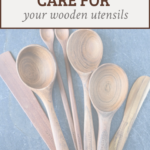
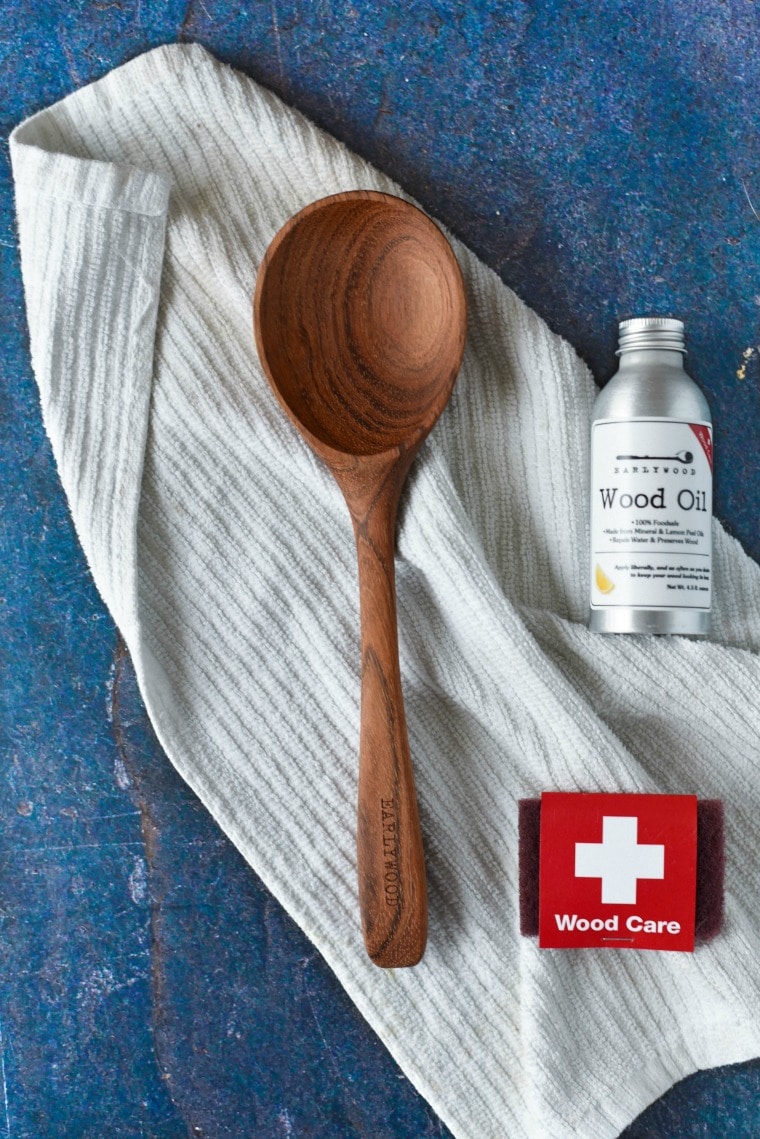
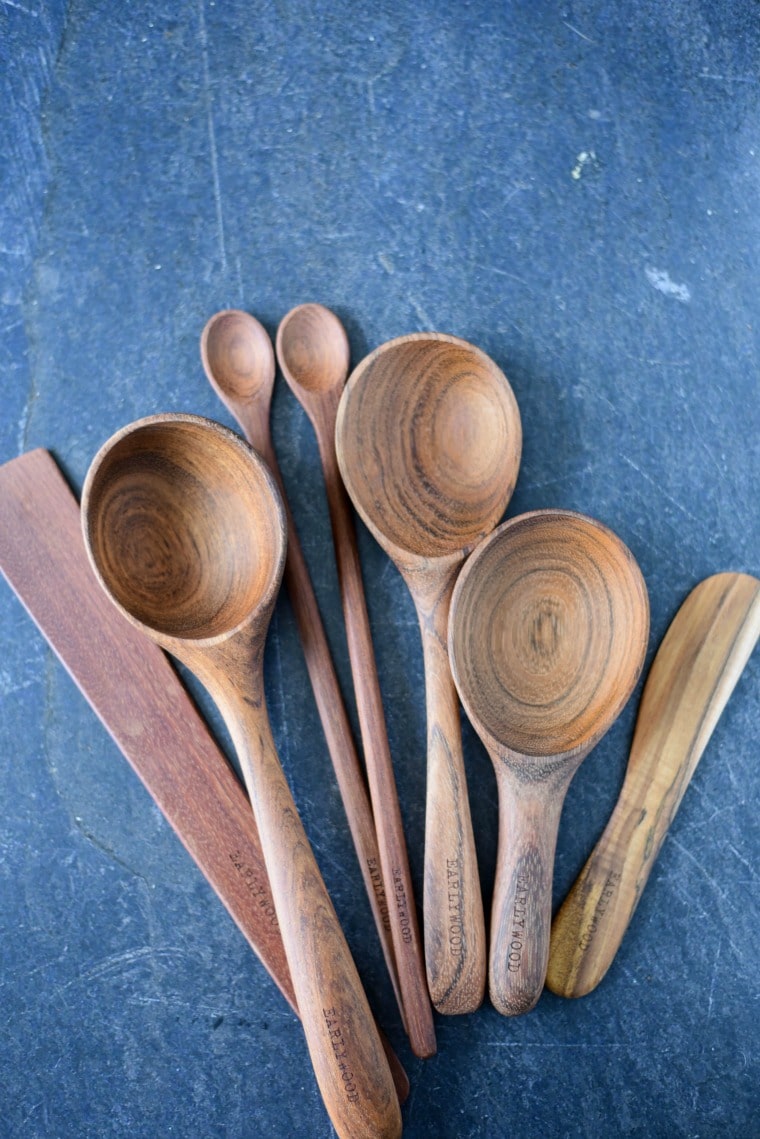
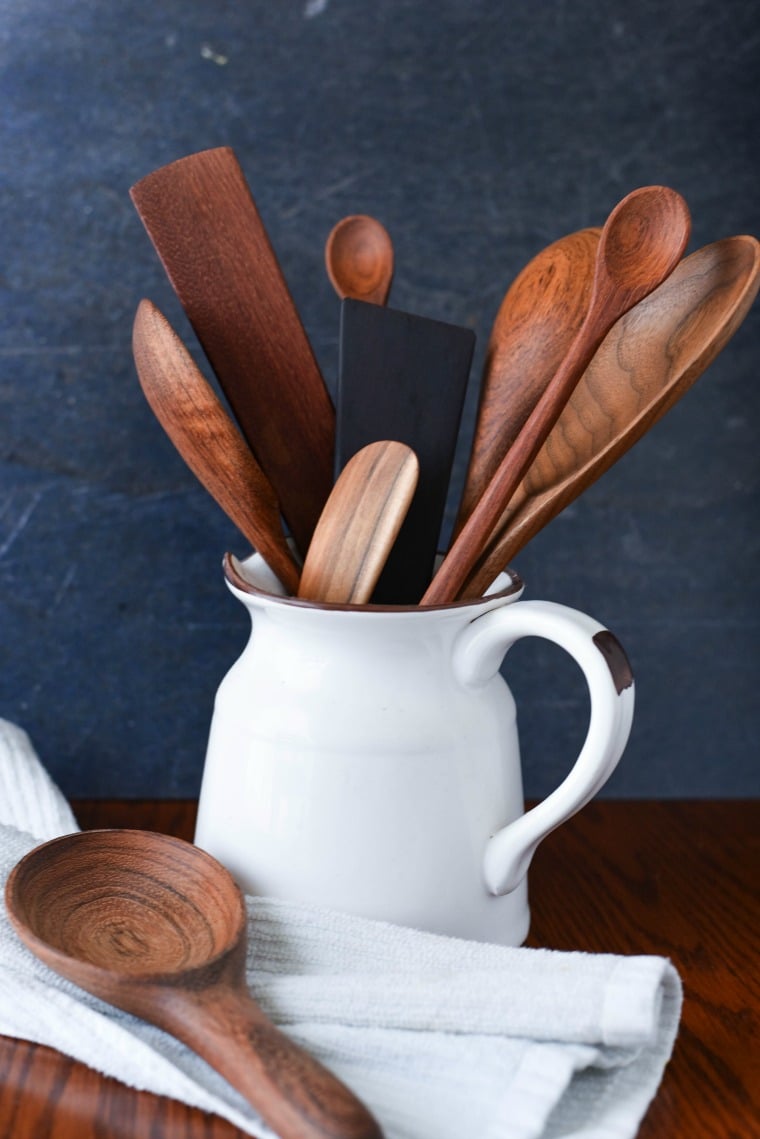
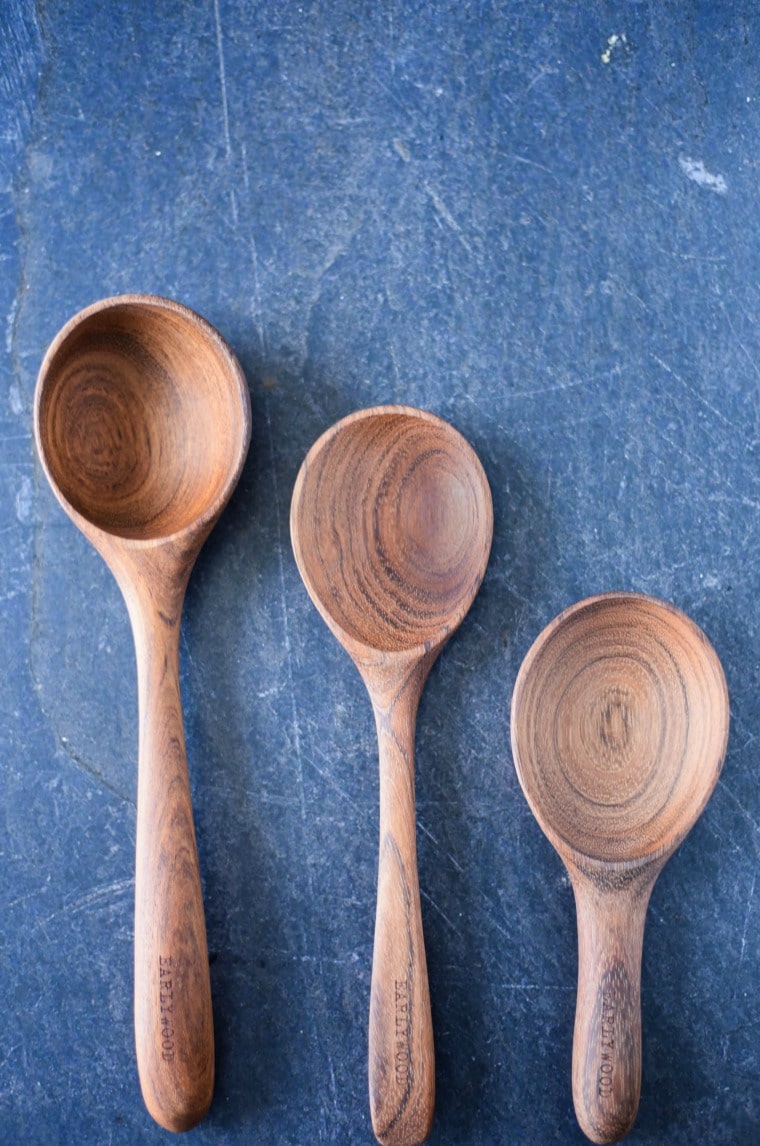
Thank you for such great information! I will certainly use your tips 🙂
I love wooden utensils. My grandfather was a hobby wood worker and my husband enjoys carpentry and carving too. He made me a cutting board for mother’s day last year. There is something about handmade objects that speaks to me. What an awesome giveaway!!
So helpful! I love wooden utensils but have a hard time taking care of them, so now I definitely know what to do! And these utensils are beautiful! Works of art!
These are beautiful!!!! Great giveaway.
These wooden spoons are gorgeous… I love all of the tips on getting the stains off (curry lover here) and how to keep them looking wonderful! Im heading over to check out their website now!!
I have some Earlywood long spoons and a couple of spreaders. Thanks for the tips on caring for them!
I wish I had a big wooden bowl or cutting board with some history – I do have a gorgeous earlywood cuttingboard that fills my heart – and hopefully will get passed down in MY family
Thank you for this information and the chance to win some of these lovely and useful items! I have wooden spoons and cutting boards but not from this brand.
This is fabulous information. I do have spoons from my Grandma that I cherish!I had no idea about reserving and keeping them clean. I love this info and the giveaway is a great one.
I have the Earlywood Trifecta. The flat saute is my favorite tool. Thank you for the cleaning information.
I have a few depression glass mixing bowls that belonged to my mother, I love them!
I want to have more, but right now the only heirloom pieces in my kitchen are a couple of pyrex pieces from the 50s.
Very informative! I need to oil my wooden spoons.
I have a vintage butter dish.
I would love some wooden spoons!
I have some of my mom’s wooden spoons I take care of them by washing them by hand and letting them air dry on a rack before putting them away. I love wooden spoons and utensils .
This post is super helpful! I’ve refused to take my grandmother’s kitchen items because I don’t know how to care for them. Now I know what to do with her wooden spoons!
I love to oil my Earlywood utensils. They look brand new every time. I’ve even thought about oiling my friends’, because they (gasp) wash theirs in the dishwasher. Next time I visit them, I’m going to bring my oil. 🙂
I don’t have any wooden heirloom pieces by my mom has a ton. I actually made a cutting board and knife rack in shop in middle school and she still has them and uses them! I will definitely pass this article on to her.
I have serious utensil envy! These spoons are gorgeous. I really need to look after mine better, I’m guilty of sticking mine in the dishwasher, no wonder they don’t last long. Thanks for the tips 🙂
These tips are totally brilliant, especially useful as I have loads of lovely wood cutting boards.
We have so many beautiful pieces in the kitchen handed down from my husbands mother. She would scour the countryside in Europe and travel out to the tiniest towns in the US to find the most amazing handcrafted pieces. I have them on display and never use them as I am afraid of stuffing them up 🙂 She kept meticulous care of EVERYTHING, and I know I can’t live up to that 🙂
I really don’t have any heirloom pieces in my kitchen, and the wooden utensils that I do have, have seen better days 🙂 I enjoyed reading all of your tips on caring for wooden utensils, properly! I’ve admired the Earlywood Designs products for the longest time, and would love to start my own heirloom collection with their wonderful pieces! Thanks for this chance!
I just love this post. We don’t have any wooden utensils or dishes except some $1 spoons from Wal-Mart. Nothing fancy or worth caring for. However, in the past, we’ve not taken great care of wooden pieces. This is wonderful information, and I had no idea how to properly care for wooden dishes. Will definitely remember this.
This is so good to know! I have a few wooden utensils that I completely avoid using because I’m scared of damaging but know I have to try these tips out!
I’m always ruining wooden spoons! Most of the ones I’ve purchased have been poor quality, but it’s time for me to get some good ones and take care of them! Hope I win!
Those spoons are gorgeous! And definitely oil your wooden utensils and cutting boards. It makes them last longer and work better. It’s really amazing how well the wood responds!
I don’t have many wood items in my kitchen but I do have roseville pottery that my grandpa purchased in the 1940’s.
These are great tips! For years I had no idea how to properly care for my wooden kitchen utensils. I have gotten better about it but these are really helpful.
I have some cast iron skillets that have been passed down for several generations. Brad is a very talented wood worker. Awesome products.
I love your posts girl! They’re so helpful – from spoons to making things more kid friendly! The spoons in these photos are absolutely beautiful. Thanks or the great tips!
This is great information! I have a few good wood spoons i’m going to give your suggestions a try
This is quite informative! Great tips! I have wooden utensils and I am so with you about the fuzzy stains, especially since I must confess, I sometimes tend to just toss in the dishwasher. I’ll be bookmarking this for future reference.
my wooden spoons look shocking!!! this is a great post, I never even would have thought about taking care of my wooden utensils properly! great tips
Thanks Georgie! I hope you learned a few tips you can start implementing!
What a wonderful post! I’ve wanted to know these very things, though I don’t have hardwood utensils (yet). 🙂 I wish I had heirloom kitchen utensils–especially well-conditioned cast iron, wooden tools, and even a few good ironstone pieces! You can’t go wrong with heirloom, really.
Love these tips! I have a few wooden spoons my mom got from France that I love but I’ve been struggling with how to oil them/ preserve them! At least I’ve kept my hubby from leaving them in the sink! The only heirloom pieces I have are a beautiful set of Dutch enameled cast iron from my Grandmother. I’ve purchased heirloom items I plan on passing down though, my All American canner and my water sealing Crocks. 🙂
Oh, I bet those enameled cast iron are so beautiful!
We have definitely had the issue with our wood utensils getting sticky, my wife uses coconut oil on them. Just picked up a bottle of walnut oil off Amazon. I don’t like the idea of using petroleum based stuff on things so it’s great to know walnut oil is a less sticky option. I wish I had heirloom pieces in my kitchen. My sister has my parent’s Mauviel pans and I dream of owning a set one day.
Good luck with the walnut oil, Dave! I am so glad you are going to try something new!
Cool, i just love to cook in wooden utensils…